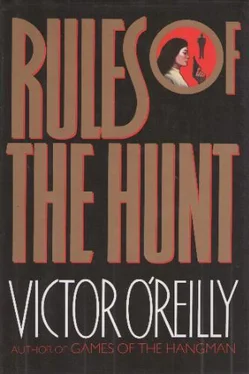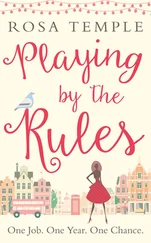Victor O'Reilly - Rules of The Hunt
Здесь есть возможность читать онлайн «Victor O'Reilly - Rules of The Hunt» весь текст электронной книги совершенно бесплатно (целиком полную версию без сокращений). В некоторых случаях можно слушать аудио, скачать через торрент в формате fb2 и присутствует краткое содержание. Жанр: Триллер, на английском языке. Описание произведения, (предисловие) а так же отзывы посетителей доступны на портале библиотеки ЛибКат.
- Название:Rules of The Hunt
- Автор:
- Жанр:
- Год:неизвестен
- ISBN:нет данных
- Рейтинг книги:4 / 5. Голосов: 1
-
Избранное:Добавить в избранное
- Отзывы:
-
Ваша оценка:
- 80
- 1
- 2
- 3
- 4
- 5
Rules of The Hunt: краткое содержание, описание и аннотация
Предлагаем к чтению аннотацию, описание, краткое содержание или предисловие (зависит от того, что написал сам автор книги «Rules of The Hunt»). Если вы не нашли необходимую информацию о книге — напишите в комментариях, мы постараемся отыскать её.
Rules of The Hunt — читать онлайн бесплатно полную книгу (весь текст) целиком
Ниже представлен текст книги, разбитый по страницам. Система сохранения места последней прочитанной страницы, позволяет с удобством читать онлайн бесплатно книгу «Rules of The Hunt», без необходимости каждый раз заново искать на чём Вы остановились. Поставьте закладку, и сможете в любой момент перейти на страницу, на которой закончили чтение.
Интервал:
Закладка:
There was one consistent element in the replies. Practically all the people who were contributing to the growing case against the Namakas had been found, upon detailed investigation, to have a Korean connection.
Adachi sipped his iced tea. Maybe it was just a coincidence. He cleaned up the room's clutter, showered, and got dressed. He slid his holstered revolver onto his belt and took the subway to Kabutcho, the district where the stock market was located, to meet the Eel.
The Eel was in a quiet corner of his favorite restaurant, a dish of his favorite food – which had given rise to his name – in front of him. Conveniently, he also owned the restaurant.
He was a round, merry-faced man in his early fifties. He had been a financial journalist for many years, but had been expelled from his press club for refusing to report a story according to the docile official line. This was a serious development, because news in Japan was disseminated only through press clubs. Members were expected to report favorably in exchange for being given information. Gaijin were not allowed to join. Press clubs were a less-than-subtle way of managing information.
The Eel had lot his job when he had been evicted from the financial press club. This could have been a disastrous situation, but he was shrewd and street smart and financially adroit. The stock market was booming. He set up a financial newspaper. He was extremely well-informed, and the venture thrived.
The rumor was that he made most of his money, not from what he published, but from businesses paying to keep stories out. Adachi did not doubt it. The Eel operated under the benevolent patronage of one of the major yakuza gangs. He owed Adachi from the time a rival organization had decided that the Eel might please them better as a publisher if he lost some weight. They had in mind the removal of his two arms and maybe a few other appendages. Adachi had stumbled on the transaction when he had dropped into the Eel's restaurant for a snack, and he had dissuaded the attackers. He had borrowed one of the assailants' swords and used it to good effect. It did not occur to him to draw his revolver.
The Eel stood up as Adachi approached, and tried to bow while greeting the policeman effusively. This was difficult given the Eel's bulk, the space between the bench he was sitting on and the table, and the fact that the lighting fixture over the table hung rather low. He was also eating. It was nearly total mayhem.
Adachi sat down and got comfortable with a beer with some relief. He liked the Eel. The man was intelligent and good company, and frankly Adachi preferred villains with something to say. Dumb thugs were all too common and made for a long working day.
"Adachi- san," said the Eel. His read name was Origa. It was not good protocol to call him ‘the Eel’ to his face, though he was quite proud of the name. Eels were associated with force and power and energy, and there were aphrodisiac and indeed financial implications. When business was brisk in the stock market, dealers rushed out to fortify themselves with eels. "Adachi- san, is it fair to say that you are not a financial sophisticate?"
Adachi smiled. "Probably," he said. "Origa- san, you've tried to interest me in your financial scams for years. I have not yet bitten. That should tell you something. I have little interest in the market."
The Eel sucked his teeth. "The Namakas, Superintendent- san?" he said. "I had better give you some background." His tone was rhetorical.
Adachi nodded encouragingly.
"Adachi- san," said the Eel, "the Tokyo stock market is not as others. On the face of it there are nearly twenty-three million shareholders, shareholder democracy personified. Closer examination reveals that corporations are over seventy-three percent of the shares and that a mere six large keiretsu – corporate holding groups – own a quarter of the market. Individuals hold about twenty-two percent."
"I'm not sure I understand the significance of this," said Adachi.
"The Tokyo stock market is purported to be a free and open market," said the Eel. "It is not. Most shares – over three-quarters – are never traded. They are held by corporations and banks on a mutually supporting basis. The equity that is traded is widely manipulated. The trade is dominated by only a handful of dealers. Prices are fixed. The insider gets the nod, then come the corporates. Finally comes the individual, the shareholder who will pay the eventual price. Privileged insiders cannot lose. They are guaranteed against loss by the dealer. Certain politicians, in exchange for favors, are privileged insiders. Hodama- san was certainly such a man."
"The Namakas?" said Adachi.
The Eel, his face shiny, shoveled a portion of umaki – grilled eel wrapped in cooked egg – into his mouth and masticated. He positively glowed as the food descended into his stomach. "Well, there is the thing," he said. "The market is going up. Virtually all shares are being hyped up, and there is Namaka Industries languishing."
"Falling?" said Adachi.
The Eel shook his head. "Going up more slowly," he said. "Way out of step with the market."
"Maybe they've shown bad results," said Adachi.
"On paper – which means nothing – they look fine," said the Eel. "Anyway, profits are not that important. Dividends are lousy. The action is in the share price. That is how the Japanese shareholder makes his money. Shares here sell for sixty to eighty times earning, sometimes more. In America, it is more like ten to twenty."
"So what is going on with the Namakas?" said Adachi.
"They are being eased ever so gently outside the club," said the Eel.
"Who's behind it?" said Adachi.
The Eel smiled. "This was not easy to find out."
Adachi picked up one chopstick and held it in both hands in a simulation of a sword, then brought it down in a fast, cutting motion.
The Eel gulped. "Uzaemon," he said. "A holding company. Now are we even?"
Adachi grinned. "Is the life that I saved worth so little?"
The Eel gave a weak smile.
"Tell me about Uzaemon," Adachi said. "And who is behind them."
The Eel went a little pale. He leaned across the table. " Yakuza ," he whispered. "Korean yakuza."
"Who exactly?" insisted Adachi.
"Katsuda- san," whispered the Eel. "The man no one ever sees. He of the hideous face."
Suddenly, Adachi realized the significance of the Korean connection among the witnesses, and that the primary motive for Hodama's death could well lie, not in current events, but in something that had happened decades ago in the chaos and confusion of postwar Japan.
He had heard something secondhand about the gang wars of the American occupation from one of the old-timers who had been his mentor. The details were hazy, but at least he knew whom to ask.
But one important question was left. If Hodama's killing was, as he now suspected, a crime of vengeance for something that had happened during the occupation, why had the attackers waited until now? Why had Hodama, with all his power and influence, lost his protection?
Indeed, who had been the true source of that protection? Japan, Korea, and the postwar period. There was only one serious contender, but many factions within it.
It was beginning to make sense.
Fitzduane had given much thought to the best tactic to employ with the Namaka brothers and had discussed the matter at length with Yoshokawa, the Spider, and Chifune. He also had his own, more lethal, agenda, which he did not discuss, except with Kilmara.
The objective, as agreed upon with his Japanese colleagues, was to force a reaction from the Namakas that would break the impasse of the investigation, link them to Yaibo, and lead to their arrest. The best method was not so obvious. The tactic was the tried-and-true police technique of ‘rattling the suspect's cage,’ but it was in how to do it that the problems lay. In the end it was decided that the first move should be a meeting with the Namakas, and the Yoshokawa would make the introductions.
Читать дальшеИнтервал:
Закладка:
Похожие книги на «Rules of The Hunt»
Представляем Вашему вниманию похожие книги на «Rules of The Hunt» списком для выбора. Мы отобрали схожую по названию и смыслу литературу в надежде предоставить читателям больше вариантов отыскать новые, интересные, ещё непрочитанные произведения.
Обсуждение, отзывы о книге «Rules of The Hunt» и просто собственные мнения читателей. Оставьте ваши комментарии, напишите, что Вы думаете о произведении, его смысле или главных героях. Укажите что конкретно понравилось, а что нет, и почему Вы так считаете.




![Беар Гриллс - The Hunt [=The Devil's Sanctuary]](/books/428447/bear-grills-the-hunt-the-devil-s-sanctuary-thumb.webp)







